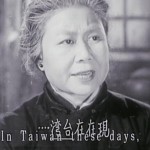- Xiao Kang performs with his lifeless costar in Tsai Ming-liang’s The Wayward Cloud
- Camp and history in Tsai Ming-liang’s The Wayward Cloud: “First Love” in front of the National Palace
- The ticket vendor makes “eye contact” with the screen heroine in Tsai Ming-liang’s Goodbye Dragon Inn
- Wanjun is informed that her “cousin” has found success in Shanghai in Li Xing’s Four Loves (1965)
- Grandmother offers advice to her neighbors in Li Xing’s Our Neighbor (1963)
- Poster for A Beautiful Duckling (1965), directed by Li Xing
- Artist Wu Songming playing the role of Huang Rongcan working on a woodblock print in the documentary Scars of 2/28
- An actor playing Lin Maosheng, who is seen shouting joyously upon hearing the radio broadcast by Emperor Hirohito, in the documentary Scars of 2/28
- An actor playing a young man putting up a sign to welcome the arrival of the Nationalist soldiers in the documentary Scars of 2/28
- Actors playing Nationalists harassing a waitress in the documentary Scars of 2/28
- An actor playing the role of a journalist writing an editorial in the documentary Scars of 2/28
- An actor playing Chen Yi, Governor-General of Taiwan, in the documentary Scars of 2/28
- A photo of Lee Teng-hui apologizing to the people of Taiwan in the documentary Postwar Era and the 2/28 Incident
- Li Mingdian appears frequently to address the audience in the documentary Postwar Era and the 2/28 Incident
- Ye Yousan showing the interviewer, Ruan Meishu, the site where his father dug his own grave in the documentary Postwar Era and the 2/28 Incident
- Zhang Xianming holds back tears as he recounts his father’s death in the documentary Postwar Era and the 2/28 Incident
- Lin Muqi and the interviewer, Ruan Meishu, demonstrating how Lin’s hands were strung together by wire before his near-execution in the documentary Postwar Era and the 2/28 Incident
- Female victimization in Opium War (1963): an innocent, homeless blind singer is almost beheaded for a crime beyond her vision.
- Endangerment of nation/family in Opium War (1963): a rehabilitated opium addict carries his youngest daughter while selling vegetables.
- Double-faced woman in Early Train from Taipei (1964): a male painter recounts the tragic urban degradation of a country girl.
- Two troubled lovers in Early Train from Taipei (1964): Xiulan (Bai Lan) pleads for understanding from Huotu (Chen Yang).
- A missed reunion in Last Train from Kaohsiung (1963): Cuicui (Bai Lan) falls from an ox cart and fails to catch a train with her lover.
- The male to-be-looked-at-ness in Lingering Passions (1962): long lost daughter recognizes her singer father on a poster outside a theater.
- Male suffering in Bamboo Wrapped Meat Dumplings (1969): the disabled father and his young daughter are caught in the rain selling dumplings.
- A caring father in Lingering Passions (1962): Hong Yifeng rocks his baby daughter to sleep after his wife has been taken away.
- Female investigation in Bride from the Hell (1965): Ruimei (Jin Mei) peeks into the keyhole and sees an eyeball.
- Gothic horror in Bride from the Hell (1965): Ruimei (Jin Mei) screams in terror after seeing an eyeball in the keyhole.
- Femme fatale in Bride from Hell (1965): the scheming cousin Fengjiao (left) lures Ruimei (Jin Mei) to a secret room behind a Buddhist altar where Ruimei’s sister was murdered.
- Romance in Bride from the Hell (1965): Ruimei (Jin Mei) and Yiming (Ke Junxiong) as the blissful newlywed on route to their honeymoon.
- Mr. Yi and Wang Jiazhi in Lust, Caution (色戒)
- Poetic representation in Nimbus, a Taiwan documentary film.
- Formosa Corporate Kingdom, from Formosa vs. Formosa, a Taiwan documentary film.































